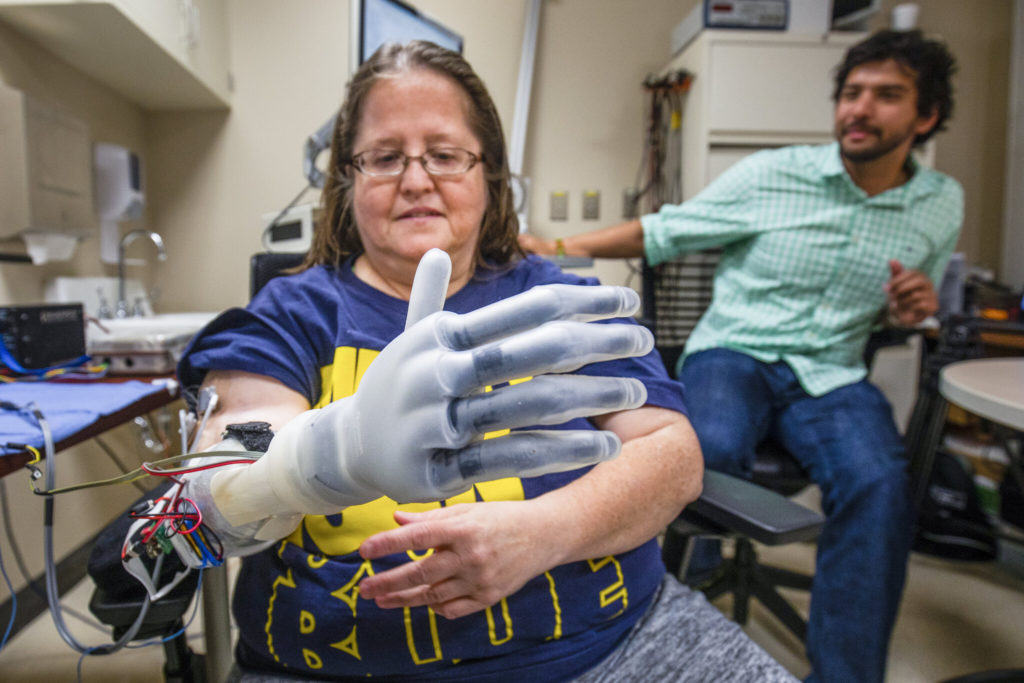2022 NSF GRFP recipients of Michigan Robotics

Congratulations to the graduate students who have been awarded prestigious National Science Foundation’s Graduate Research Fellowships. The program, which helps ensure the quality, vitality, and diversity of the scientific and engineering workforce, recognizes graduate students in NSF-supported science, technology, engineering, and mathematics disciplines who are pursuing masters and doctoral degrees.
Students from Michigan Robotics who received the fellowship include:
Kevin Best
Kevin’s research aims to develop agile control strategies for powered prosthetic legs used by people with above-knee amputations. Specifically, he focuses on clinically viable control strategies that produce behavior similar to biological limbs during walking on variable and uneven terrains. His end goal is to develop “plug-and-play” robotic prostheses, capable of everything from playing tag to climbing a mountain.
Kevin is advised by Professors Bobby Gregg and Elliott Rouse. He received his B.S. in Mechanical Engineering from the University of Notre Dame in 2018 and is currently in his second year of graduate school with the Michigan Robotics Institute.
Mark Nail
Mark is a second-year Ph.D. student currently working with Professors Ella Atkins and Brent Gillespie. Mark’s work in both the A2Sys and Haptix Labs is focused on using dynamic stability, commonly used in walking robots, to extend the aerial manipulation capabilities of rotary unmanned aircraft. This allows for minimal interaction time between the unmanned vehicle and the environment, limiting risks associated with aerial manipulation in unpredictable environments. Mark’s goals are to extend this research to allow for aerial manipulation and sampling of rainforest tree branches to more reliably and safely enable rainforest ecological studies.
Anvay Pradhan
Anvay is an incoming Mechanical Engineering PhD student starting Fall 2022. He is currently completing his undergraduate studies at the University of Iowa pursuing dual degrees in Mechanical Engineering and Computer Science with a minor in math. As an undergraduate, Anvay has worked on multiple research projects, ranging from tribology to space physics instrumentation to industrial robotics. More recently, he worked to develop an origami-inspired metamaterial with tunable permeability with researchers at the California Institute of Technology. As a PhD student, Anvay plans to work in soft robotics, specifically on creating robotic models that mimic snake anti-predator behaviors while being safely huntable by real animals. He will be co-advised by Professors Talia Moore and Evgueni Filipov.
Anja Sheppard
Anja is joining the Field Robotics Lab as a Robotics PhD student this fall. Her research will focus on autonomous robotic exploration and perception, especially as applied to underwater and space environments. She has contributed to robotic technology development at NASA’s Johnson Space Center for the past two years. At Michigan, Anja will be advised by Professor Katie Skinner.
Anja will receive her bachelor’s degree in computer science from the University of Texas at Dallas in May of 2022. She also has a minor in philosophy and enjoys discussing topics surrounding tech ethics. In her free time, she likes to read, cook, and spend time outside.
Karthik Urs
Karthik is a current Research Assistant in EMBiR Lab, working on actuators and robot design for legged robots, to be used as a tool to study animal and robot locomotion. In addition to building high performance robots, he makes accessibility and reproducibility of his work a top priority, making all his work open-source, low-cost, and reproducible by biomechanists and others without engineering backgrounds. Through this work, he hopes to bridge the gap between biologists and engineers so that we may both better understand animal legged locomotion and build more capable robots.
Karthik received the MS degree in Robotics, BSE degree in Mechanical Engineering, and BSE degree in Computer Engineering from the University of Michigan. He will join the NASA Jet Propulsion Laboratory later this year as a Mechatronics Engineer, building mechanisms for the next generation of planetary exploration robots.
Katharine Walters
Katharine will join the Locomotor Control Systems lab as a Robotics PhD student in the fall. Her research will focus on task-invariant control of exoskeletons. Through this work, she hopes to improve the stability and functionality of rehabilitative exoskeletons in activities of daily living. She will be advised by Professor Robert Gregg.
Katharine will receive her bachelor’s degree in Mechanical Engineering from Michigan State University in May 2022. While at MSU, she worked in the Biomechanical Design and Research Lab (led by Dr. Tamara Bush), where she helped study the effects of surgery on arthritic hand function and study the relationship between posture and discomfort during office work.